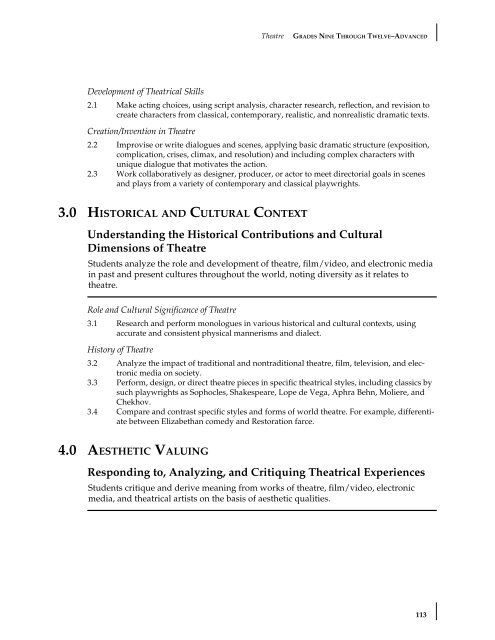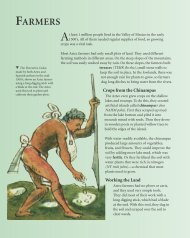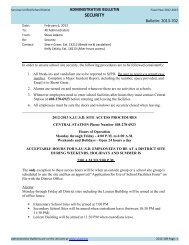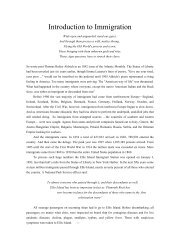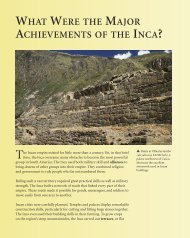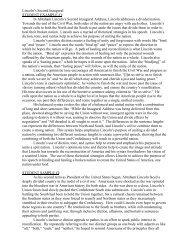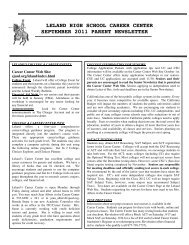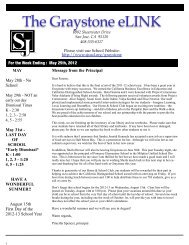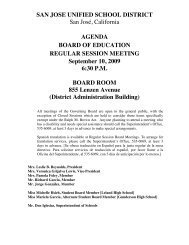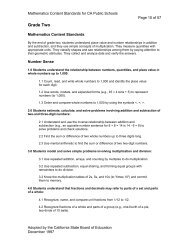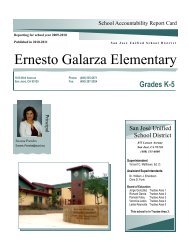Visual and Performing Arts Content Standards - California ...
Visual and Performing Arts Content Standards - California ...
Visual and Performing Arts Content Standards - California ...
Create successful ePaper yourself
Turn your PDF publications into a flip-book with our unique Google optimized e-Paper software.
Development of Theatrical Skills<br />
Theatre GRADES NINE THROUGH TWELVE–ADVANCED<br />
2.1Make acting choices, using script analysis, character research, reflection, <strong>and</strong> revision to<br />
create characters from classical, contemporary, realistic, <strong>and</strong> nonrealistic dramatic texts.<br />
Creation/Invention in Theatre<br />
2.2 Improvise or write dialogues <strong>and</strong> scenes, applying basic dramatic structure (exposition,<br />
complication, crises, climax, <strong>and</strong> resolution) <strong>and</strong> including complex characters with<br />
unique dialogue that motivates the action.<br />
2.3 Work collaboratively as designer, producer, or actor to meet directorial goals in scenes<br />
<strong>and</strong> plays from a variety of contemporary <strong>and</strong> classical playwrights.<br />
3.0 HISTORICAL AND CULTURAL CONTEXT<br />
Underst<strong>and</strong>ing the Historical Contributions <strong>and</strong> Cultural<br />
Dimensions of Theatre<br />
Students analyze the role <strong>and</strong> development of theatre, film/video, <strong>and</strong> electronic media<br />
in past <strong>and</strong> present cultures throughout the world, noting diversity as it relates to<br />
theatre.<br />
Role <strong>and</strong> Cultural Significance of Theatre<br />
3.1Research <strong>and</strong> perform monologues in various historical <strong>and</strong> cultural contexts, using<br />
accurate <strong>and</strong> consistent physical mannerisms <strong>and</strong> dialect.<br />
History of Theatre<br />
3.2 Analyze the impact of traditional <strong>and</strong> nontraditional theatre, film, television, <strong>and</strong> electronic<br />
media on society.<br />
3.3 Perform, design, or direct theatre pieces in specific theatrical styles, including classics by<br />
such playwrights as Sophocles, Shakespeare, Lope de Vega, Aphra Behn, Moliere, <strong>and</strong><br />
Chekhov.<br />
3.4 Compare <strong>and</strong> contrast specific styles <strong>and</strong> forms of world theatre. For example, differentiate<br />
between Elizabethan comedy <strong>and</strong> Restoration farce.<br />
4.0 AESTHETIC VALUING<br />
Responding to, Analyzing, <strong>and</strong> Critiquing Theatrical Experiences<br />
Students critique <strong>and</strong> derive meaning from works of theatre, film/video, electronic<br />
media, <strong>and</strong> theatrical artists on the basis of aesthetic qualities.<br />
113


